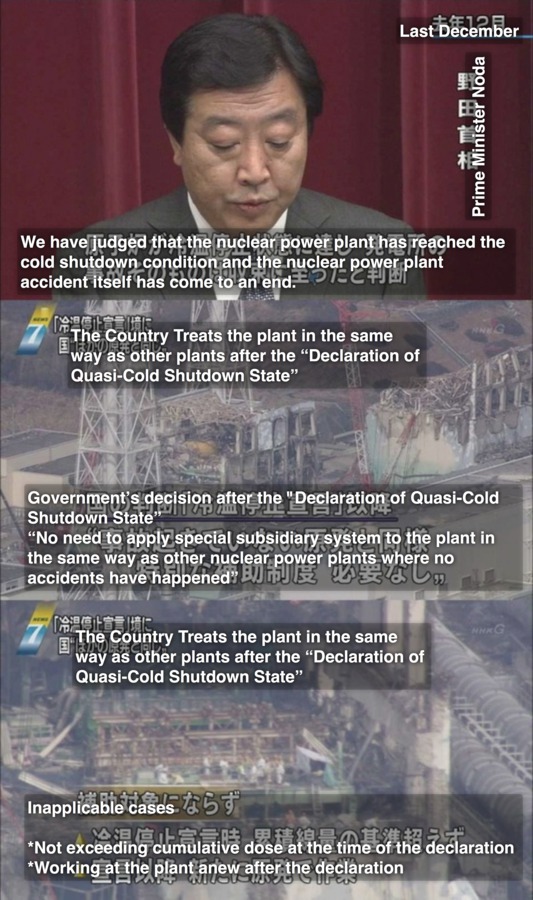Masatoshi Takeshita
English translation of an excerpt from a Japanese article: Monju Bosatsu – Septemter 12, 2012 –
The
Ministry of Health, Labor and Welfare Says “Because Stricken Reactors at Fukushima
No. 1 Nuclear Power Plant Reached a State of Quasi-Cold Shutdown, Workers
Exposed to Radiation Exceeding the Dose Limit Are Not Cared For”
It is said that the Ministry has
stopped providing the subsidies
for
examination to workers at the Fukushima No.1 nuclear power plant who have been
exposed to radiation beyond the dose limit, based on the reasoning that the stricken
nuclear reactors at Fukushima No. 1 plant has reached a state of quasi-cold shutdown and has been back to the
normal state and the plant should be treated in the same way as other nuclear
power plants where no accidents have happened.
Work of the Devil
(an excerpt from the NHK news article)
‘Difference” in health support among nuclear power
plant workers
September 12,
2012: 1910
It has been found that
the subsidy system for examinations shall not apply to subcontract workers
exposed to radiation at the TEPCO Fukushima No. 1 nuclear power plant accident even
if they have been exposed to radiation beyond the dose limit anew, after the declaration
of quasi-cold shutdown state of reactors made by the Ministry of Health, Labor
and Welfare last December.
Experts point out that “As workers are
working under the condition of still high dose, the government should keep
giving careful support to them.
After the accident, the Ministry designated
the work at the plant for restoration from accident as “emergency work” because
workers were likely to be exposed to high dose of radiation at the worksite.
As a result, the Ministry called for the
employer to have workers examined for cataract in case of cumulative exposure
dose exceeding 50 mSv and for cancer in case of cumulative exposure dose exceeding
100 mSv, respectively. It also
established the system in which the government subsidizes examination costs to
smaller subcontractors.
However, as the government declared the quasi-cold
shutdown state of the reactors last December, the Ministry cancelled the
designation of “emergency work” and decided to subsidize only workers who had
already been exposed to radiation exceeding the dose limit at that time.
In line with the decision
, those exposed to radiation exceeding the dose limit can continue
to get subsidy for regular examinations, but
those who
started working immediately after the accident and were found to be exposed to
radiation exceeding the dose limit after the declaration or those who joined
the work anew after the declaration are exempt from the subsidy system.
Workers are just disposable
pieces.
